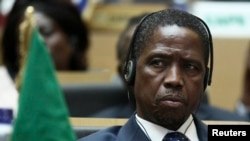The Episcopal Conference of Zambia has called on all political parties and their presidential candidates to take steps to curb politically motivated violence ahead of the country’s August 11 presidential election.
The organization of Roman Catholic bishops met Tuesday with all political parties and their candidates. Father Cleophas Lungu, secretary general of the conference, said the meeting made a number of proposals to deal with some of the root causes of the political tension and violence in the country.
Lungu said among the suggestions was amending the Public Order Act, which the police use to manage political gatherings.
“There was a general consensus that the law itself had some gaps and needed to be reviewed and amended so that the application of it does not disadvantage any political party, especially the opposition parties. But the law is applied fairly and objectively by those who have that responsibility, especially the police,” he said.
Opposition and civil society groups have often accused the Zambian police of bias and violating the constitution after clamping on their rights to free speech and assembly as stipulated in the bill of rights. The groups said the police often use the controversial Public Order Act to suppress their meetings and their planned demonstrations against unfavorable government policies. They also said the police are to blame for the ongoing inter-party violence because of the preferential treatment they give governing PF supporters.
But the Zambia police say the Public Order Act underscores the importance of groups and political parties coordinating their planned activities with the police to ensure there is peace and stability. The law, police also say, regulates the holding of public processions or demonstrations.
Lungu said all political parties attending the meeting acknowledged that the issue of political violence was not unique to one party. He said to a great extent the government has not done enough to curb the violence. Lungu said the Zambia Episcopal Conference has committed itself to holding the country’s political leaders accountable.
“We have come together to form what we call the Christian Churches Monitory Group. We are monitoring the conduct of the election this year. We are going to keep record of what they say, and whenever we see that they are saying something which is contrary to what they have committed themselves to, we have put it very clear to them that we are going to call them back for a review meeting,” Lungu said.
Zambians have expressed concern about clashes between supporters of political parties as the groups ready to begin official campaigning for the elections. Local media organizations have often reported incidents of inter-party clashes, often between the governing Patriotic Front (PF) and opposition parties, including the United Party for National Development (UPND) and the Movement for Multi-party Democracy (MMD).
UPND supporters were recently attacked by security personnel during Youth Day celebrations at the Freedom Statue in Lusaka in view of some ruling Patriotic Front party officials. In another incident, a video of an opposition member being stripped naked by ruling party members in full view of police officers also went viral on social media.
